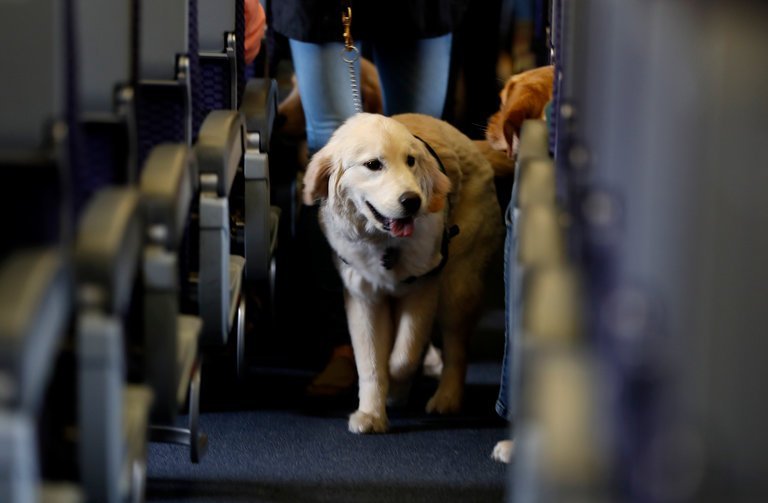
Delta Air Lines said on Friday that it was tightening its rules for transporting service and support animals in an effort to reduce misbehavior by dogs and other creatures that air carriers are required by law to allow on board.
Service dogs are specially trained to aid people with disabilities. Emotional support animals provide comfort and companionship to their owners and do not require coaching.
Delta, which carries nearly 250,000 such animals a year, said that starting March 1, it would require documentation about their health and, in some instances, a promise of good conduct. The new rules make Delta’s policy among the most demanding among major carriers.
The number of service and support animals, which federal regulations say must fly at no cost and uncaged, with some exceptions, has surged 150 percent on Delta planes since 2015. Customers, the airline said in announcing the move, had “attempted to fly with comfort turkeys, gliding possums known as sugar gliders, snakes, spiders and more.”
But the surge has brought more instances of conflict among passengers, some of whom have complained about allergies and other disturbances, as well abuses of the policy, with some travelers trying to avoid the costs of flying with regular pets.
Continue reading the main story
RELATED COVERAGE
VOCATIONS
Flying Abandoned Animals to Safer Havens DEC. 22, 2017
Delta to Offer Free In-Flight Text Messaging SEPT. 27, 2017
YOUR MONEY
When It Costs Double to Let Your 12-Year-Old Fly Alone JAN. 5, 2018
Those Seatback Screens on Planes Are Starting to Disappear JAN. 1, 2018
ADVERTISEMENT
Continue reading the main story
Flying with a pet that does not perform a special service generally costs more than $100, and the animal must generally be kept under the seat in a carrier or put in a kennel and checked in.
On average, Delta flights carry more than 500 support animals and nearly 200 service animals each day. Airlines are not required to accommodate certain service animals, including ferrets, rodents and reptiles.
But safety concerns related to the animals allowed to accompany passengers have climbed sharply. Reports of in-flight animal incidents have risen 84 percent since 2016, a result of “a lack of regulation,” Delta said. More untrained animals are being brought onto planes, where they urinate, defecate, bark, growl, lunge and exhibit other behavior uncommon among companions that are properly taught.
In June, a 70-pound support dog mauled a passenger on a Delta flight in Atlanta, biting the man’s face multiple times.
Delta hopes “to find a solution that supports those customers with a legitimate need for these animals, while prioritizing a safe and consistent travel experience,” John Laughter, the airline’s senior vice president of safety, security and compliance, said in a statement on Friday.
As of March 1, passengers with service or support animals will have to submit proof of health or vaccinations through Delta’s website at least 48 hours before their flight.
Customers with psychiatric service animals and emotional support animals must also sign a document attesting to the animals’ ability to behave in the cabin or risk being barred from boarding or removed from the plane.
Delta does not require evidence that the animal has graduated from obedience school. Current rules at Delta and other airlines require travelers to provide a letter prepared and signed by a doctor or a licensed mental health professional explaining why the animal needs to be on board.
Airlines, however, have grumbled that it is difficult to verify the legitimacy of such letters. Many passengers have tried to evade the high cost and hassle of traveling with their pets by giving them a service or support designation.
Other passengers have complained of comfort animals triggering allergic reactions, sprawling over arm rests and causing ruckuses.
Eric Lipp, the executive director of Open Doors Organization, a nonprofit group that supports disabled travelers and tourists, described Delta’s new policy is “unfortunate” and “extreme.”
“People have abused the privilege and ruined the image of service animals,” Mr. Lipp said. “And now they’re creating a whole lot more hassle for disabled people to travel, penalizing them for needing a service animal, putting another roadblock in front of them.”
Charles Hobart, a spokesman for United Airlines, said the company was reviewing its existing policy on the animals to “better balance” employee and passenger protection with accommodations for disabled customers.
Ross Feinstein, a spokesman for American Airlines, said the company agreed with Delta’s efforts and was also “looking at additional requirements.”
The federal Transportation Department said in an email on Friday that it planned to solicit public comments this summer on the appropriate definition of a service animal and suggestions for strategies to prevent travelers from abusing that definition.
“Air travel should be safe for passengers and airline employees and accessible for all passengers,” the agency said in a statement. “We will monitor Delta’s policy to ensure that it preserves and respects the rights of individuals with disabilities who travel with service animals.”
The agency has made other moves in recent years to address the increase in service and support animals.
It now requires that hundreds of airports in the United States set aside areas in each terminal, accessible by wheelchair, for service animals to relieve themselves. Individual airports have also tried to cater to the animals’ needs, with Kennedy International Airport opening a luxurious, 80,000-square-foot animal center last year with “pawdicures” for dogs and high-end horse stalls.
Hi! I am a robot. I just upvoted you! I found similar content that readers might be interested in:
https://www.nytimes.com/2018/01/19/business/delta-airlines-service-animals.html